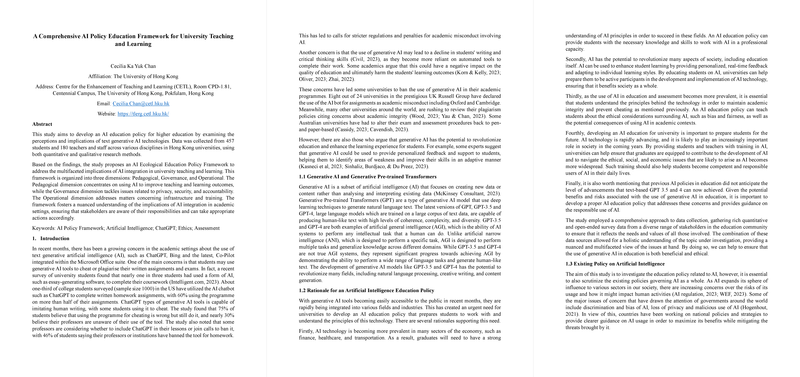Analyzing AI Policy Education for University Settings: A Framework for Adoption
The paper "A Comprehensive AI Policy Education Framework for University Teaching and Learning" by Cecilia Ka Yuk Chan introduces a structured approach to developing an effective AI education policy in higher education institutions. This research emphasizes the multifaceted impacts of integrating text generative AI—such as ChatGPT—into academic environments and proposes an AI Ecological Education Policy Framework structured around Pedagogical, Governance, and Operational dimensions.
Key Insights and Methodology
The research involves a comprehensive survey of 457 students and 180 educators and staff from Hong Kong universities, aiming to understand their perceptions and experiences with AI tools. Through a mix of quantitative and qualitative data collection methods, the paper underscores significant apprehensions around academic integrity, equitable access, and ethical dilemmas posed by generative AI. The data indicate that approximately one-third of students acknowledged using AI tools like ChatGPT for completing coursework, which raises concerns about cheating and the decline of critical skills. Moreover, responses signal ambivalent attitudes among educators on the role of AI, ranging from a potential learning enhancer to a tool that may compromise traditional education values.
AI Ecological Education Policy Framework
The proposed framework is divided into three dimensions, each led by different university stakeholders. The Pedagogical Dimension targets educational practices, advocating for assessments that incorporate AI while enhancing students' analytical and critical skills. The Governance Dimension highlights the necessity of policies addressing data privacy, transparency, and ethical conduct to navigate AI's ethical complexities. Meanwhile, the Operational Dimension focuses on the practical integration of AI, emphasizing continuous training and infrastructure support.
Pedagogical Implications
The framework addresses the educational implications of AI by encouraging universities to redefine assessment strategies and incorporate AI literacy into the curriculum. The findings suggest a need to balance AI tool integration while promoting essential soft skills like teamwork and leadership that AI might otherwise undermine. Furthermore, this dimension underlines the potential for AI to prepare students for an increasingly AI-driven workforce by enhancing digital literacy.
Governance and Ethical Considerations
As universities are urged to formulate policies proactively, the paper highlights the governance challenges surrounding AI, especially concerning data security and ethical responsibility. The framework proposes explicit guidelines to prevent misconduct and foster transparency, embedding accountability in AI functionalities. This aligns with the survey's indication that both students and educators believe in the necessity of having institutional strategies to manage AI-related risks.
Operational and Practical Aspects
The operational dimension calls for equipping faculty and students with AI literacy and resources. By emphasizing training and technical support, the proposed framework aims to seamlessly integrate AI into academia. However, the paper acknowledges the potential disparities in access to AI tools, advocating for equitable availability to prevent socio-economic biases.
Comparative Analysis with UNESCO Recommendations
Though the paper aligns partially with UNESCO's high-level recommendations for AI in education, it specifically addresses the unique needs of university-level teaching. While UNESCO provides a broad ethical and strategic backdrop, Chan's framework offers a practical roadmap for direct application within higher education, ensuring a nuanced response to AI's advancements and challenges.
Conclusion and Future Directions
The paper contributes significantly to AI policy discourse by offering a specialized framework catering to the higher education context. It acknowledges current policy gaps—particularly concerning evolving AI technologies like GPT-3.5 and GPT-4—and emphasizes the critical need for comprehensive, system-wide adoption of ethical AI practices. Moving forward, continued exploration and evidence-based assessment of AI’s role in education will be vital, facilitating responsible innovation and safeguarding academic integrity in evolving digital landscapes. The AI Ecological Education Policy Framework serves as both a practical guide and a call to action for institutions to engage with AI responsibly while navigating its complexities and potentials.
